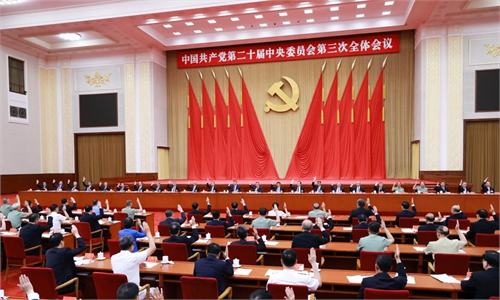Comprehensive reform blueprint to accelerate nation’s modernization, boost foreign confidence


A view of Beijing's CBD area Photo: VCG
The recently released communique from the third plenary session of the 20th Central Committee of the Communist Party of China (CPC) laid out an unequivocal commitment to further deepening reform comprehensively to advance Chinese modernization, which underscored the distinctive features of the system of socialism with Chinese characteristics.The broad economic policy objectives articulated in the communique aptly embody the five major features of Chinese modernization - a huge population, common prosperity for all, coordination of material and cultural-ethical advancement, harmony between humanity and nature, and peaceful development, serving as a more detailed blueprint for the modernization goals outlined in the report to the 20th National Congress of the CPC.
Among the highlights of China's upcoming reform efforts included ensuring and enhancing the people's well-being during development, described in the communique as one of the major tasks linked to Chinese modernization, calling for doing everything within the country's capacity in this regard and refining the system to guarantee basic public services. This reflected the policies' emphasis on effectively addressing issues of utmost concern, direct relevance, and immediate importance to the people.
In this context, more definitive actions are expected to be centered on improving the income distribution system, the employment-first policy, and the social security system, further reforming the medical and healthcare systems, and improving the systems for facilitating population development and providing related services.
These objectives are of utmost significance, as they underscore the imperative need for substantial reform that will deliver immediate and tangible benefits to the population, which are central to China's modernization agenda.
The communique clarified the guiding principles and shed light on China's economic reform and development trajectory for the upcoming decade. It vowed to implement various measures for preventing and defusing risks in real estate, local government debt, small and medium financial institutions, and other key areas, in a bid to ensure both development and security.
This reflected the central government's awareness of these critical economic agendas and its resolve to address them, closely in line with the objectives outlined in the Central Economic Work Conference last year and this year's Government Work Report.
The reiteration of these goals also highlighted the central government's sustained commitment to key reform priorities, suggesting in-depth discussions on these issues during the third plenum and that specific follow-up measures are expected to be implemented in the near future.
The communique proposed numerous directional measures addressing major development issues to build a high-standard socialist market economy by 2035, thereby sketching a strategic blueprint for China's future economic reform. To achieve these goals, the government's top agenda will be to leverage the role of the market better, fostering a fairer and more dynamic market environment, and making resource allocation as efficient and productive as possible.
Moreover, China's commitment to deepening reform of the fiscal and taxation systems, further reforming the financial system, and improving mechanisms for implementing the coordinated regional development strategy is also highly significant for realizing China's long-term development goals.
Following the plenum, it is believed that an array of longstanding and unresolved major issues will be met with specific measures.
As the global community closely follows China's reform plans, the detailed blueprint in the communique shows China's commitment to the basic state policy of opening to the outside world and continuing to promote reform through opening-up, described as a defining feature of Chinese modernization.
There is reason to believe that China will continue to steadily expand institutional opening-up, deepen the foreign trade structural reform, and further reform the management systems for inward and outward investment. This will further reassure foreign businesses and investors, bolstering their confidence in the Chinese market.
Against this backdrop, international cooperation should focus on enhancing our opening-up capabilities - by both opening doors to the global arena and encouraging domestic enterprises to expand globally.
The communique also analyzed the current economic situation and the tasks we face, highlighting that we must remain firmly committed to accomplishing this year's economic and social development goals.
Given this emphasis, further stimulating measures are expected to be introduced in the second half of the year, particularly regarding the boost to domestic demand, as highlighted in the communique. Efforts to expand domestic consumption are anticipated to speed up to ensure this year's growth target. This is crucial for conveying a positive message to the international community.
The author is the director of Tsinghua University's Academic Center for Chinese Economic Practice and Thinking (ACCEPT). bizopinion@globaltimes.com.cn



